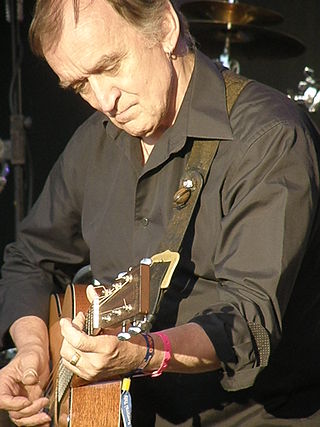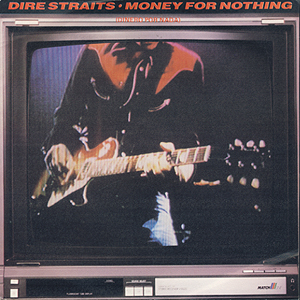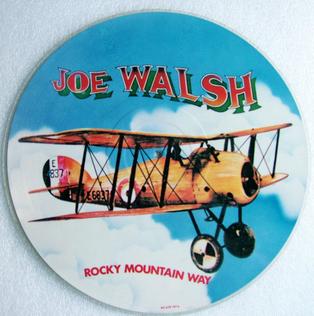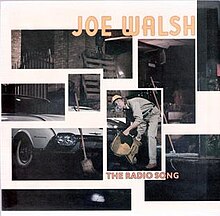
Robert Weston Smith, known as Wolfman Jack, was an American disc jockey active for over 3 decades. Famous for the gravelly voice which he credited for his success, saying, "It's kept meat and potatoes on the table for years for Wolfman and Wolfwoman. A couple of shots of whiskey helps it. I've got that nice raspy sound."

Martin Carthy MBE is an English folk singer and guitarist who has remained one of the most influential figures in British traditional music, inspiring contemporaries such as Bob Dylan and Paul Simon, and later artists such as Richard Thompson, since he emerged as a young musician in the early days of the folk revival in the UK during the 1960s and 1970s.

Screaming Trees were an American rock band formed in Ellensburg, Washington, in 1984 by vocalist Mark Lanegan, guitarist Gary Lee Conner, bassist Van Conner, and drummer Mark Pickerel. Pickerel was replaced by Barrett Martin in 1991. Screaming Trees became known as one of the pioneers of grunge along with Melvins, Mudhoney, U-Men, Skin Yard, Soundgarden, Green River, and Malfunkshun, among others. Although widely associated with grunge, the band's sound incorporated hard rock and psychedelic elements.

Joseph Fidler Walsh is an American guitarist, singer, and songwriter. Best known as a member of the rock band Eagles, his five-decade career has also included solo work and stints in two other successful rock bands: James Gang and Ringo Starr & His All-Starr Band. He was also part of the New Zealand band Herbs. In the 1990s, he was a member of the short-lived supergroup The Best.

Triumph was a Canadian hard rock band formed in 1975 that was popular in the late 1970s and the 1980s, building on its reputation and success as a live band. Between its 16 albums and DVDs, it has received 18 gold and nine platinum awards in Canada and the United States. It was nominated for multiple Juno Awards, including the 'Group of the Year Award' in 1979, 1985, 1986, and 1987. It was inducted into the Canadian Music Industry Hall of Fame in 2007, into the Canadian Music Hall of Fame in 2008, and into Canada's Walk of Fame in 2019.

Marty Willson-Piper is an English guitarist and singer-songwriter best known as a former long-time member of the Australian psychedelic rock band The Church. He joined in 1980 after seeing an early gig where they were performing as a three-piece. He was an integral member of the band for 33 years. He was also the guitarist for the English alternative rock band All About Eve from 1991 to 1993 and again from 1999 to 2002. He has also worked with Swedish progressive rock band Anekdoten.

Dramarama is an American, New Jersey–based alternative rock/power pop band, who later moved to Los Angeles. The band was formed in New Jersey in 1982 and disbanded in 1994. The band formally reunited in 2003 following an appearance on VH1's Bands Reunited.

Got Any Gum? is the eighth solo studio album by the American singer-songwriter Joe Walsh. It was originally released in October 1987, on the label Warner Brothers in the United States, and Full Moon in the UK, which was the last Walsh album to be released by either of those labels. The album features eight original songs which were written by Walsh with others and by himself, the album also features two covers, including the song "In My Car", which was co-written by Walsh with Ringo Starr, the former drummer for The Beatles. The album also features vocal contributions from J. D. Souther and Survivor's lead vocalist Jimi Jamison.

"Money for Nothing" is a song by British rock band Dire Straits, the second track on their fifth studio album, Brothers in Arms (1985). It was released as the album's second single on 28 June 1985 through Vertigo Records. The song's lyrics are written from the point of view of two working-class men watching music videos and commenting on what they see. The song features a guest appearance by Sting singing background vocals, providing both the signature falsetto introduction and backing chorus of "I want my MTV". The groundbreaking video was the first to be aired on MTV Europe when the network launched on 1 August 1987.

"Alive" is the debut single by American rock band Pearl Jam. It was released on July 7, 1991, 51 days before the release of the band's debut album, Ten, on which "Alive" appears. Written by guitarist Stone Gossard, the song originated as an instrumental titled "Dollar Short" and was included on a demo tape circulated in hopes of finding a singer for the group. Vocalist Eddie Vedder obtained a copy of the tape and wrote lyrics that describe a somewhat fictionalized account of the time when he was told that the man he thought was his father was not actually his biological parent.

"Don't Stop Me Now" is a song by the British rock band Queen featured on their 1978 album Jazz that was released as a single in 1979. Written by lead singer Freddie Mercury, it was recorded in August 1978 at Super Bear Studios in Berre-les-Alpes (Alpes-Maritimes), France, and is the twelfth track on the album.
"Aqualung" is a song by the British progressive rock band Jethro Tull, and the title track from their Aqualung (1971) album. The song was written by the band's frontman, Ian Anderson, and his then-wife Jennie Franks.

Robbie Robertson is the solo debut album by Canadian rock musician Robbie Robertson, released in 1987. Though Robertson has been a professional musician since the late 1950s, notably a founder of and primary songwriter for The Band, this was his first proper solo album. Robbie Robertson won the Juno Award for "Album of the Year", and producers Daniel Lanois and Robertson won the "Producer of the Year" Juno award, both in 1989; there were no Juno Awards in 1988.

"Runaway" is the debut single by American rock band Bon Jovi. It was originally recorded in 1981 for the so-called "Power Station Demos" at the beginning of singer Jon Bon Jovi's career, featuring the vocalist backed by session musicians.

Back in the High Life is the fourth solo album by English singer, songwriter, and multi-instrumentalist Steve Winwood, released on 30 June 1986. The album proved to be Winwood's biggest success to that date, certified Gold in the UK and 3× Platinum in the US, and it reached the top twenty in most Western countries. It collected three Grammy Awards and generated five hit singles, starting with "Higher Love", which became Winwood's first Billboard Hot 100 number-one chart topper, coming 20 years after he first entered that chart with "Keep on Running" by the Spencer Davis Group. Other global hit singles from the album were "Freedom Overspill", "Back in the High Life Again" and "The Finer Things". The single "Split Decision", with ex-Eagles guitarist Joe Walsh, was a US hit.
"Brother Where You Bound" is the title track to English rock band Supertramp's 1985 album of the same name. Written and sung by keyboardist Rick Davies, it is the longest song Supertramp recorded at over sixteen minutes.

Richard Marx is the debut studio album by singer/songwriter and record producer/arranger, Richard Marx, released in June 1987.

"Know Your Enemy" is a protest song by American rock band Green Day. It is the third track on their eighth album, 21st Century Breakdown, and it was released as the lead single through Reprise Records on April 16, 2009, and the group's first single since "Jesus of Suburbia", released 4 years earlier. Billboard described the song as being lyrically "just as politically charged as last time ", having a "Modern Rock radio-ready chorus", whilst the song's producer Butch Vig "brings enough punk sheen for mass appeal." It was the first, and one of only three songs, to top the Rock Songs, Alternative Songs and Mainstream Rock Tracks Billboard charts at the same time. "Know Your Enemy" has been certified Gold by the RIAA and has sold 798,000 copies as of August 2010.

"Don't Mean Nothing" is the debut single by singer/songwriter/producer Richard Marx from his triple platinum 1987 eponymous album. It hit No. 1 on Billboard's Album Rock Tracks chart and No. 3 on the Hot 100. With the chart success of "Don't Mean Nothing" and subsequent singles from his debut album, Marx became the first male artist to reach the top three of the Billboard Hot 100 pop chart with four singles from a debut album.

"Rocky Mountain Way" is a 1973 song by rock guitarist Joe Walsh and his band Barnstorm, with writing credits given to all four band members: Walsh, Rocke Grace, Kenny Passarelli, and Joe Vitale. The song was originally released on the album The Smoker You Drink, the Player You Get.
















